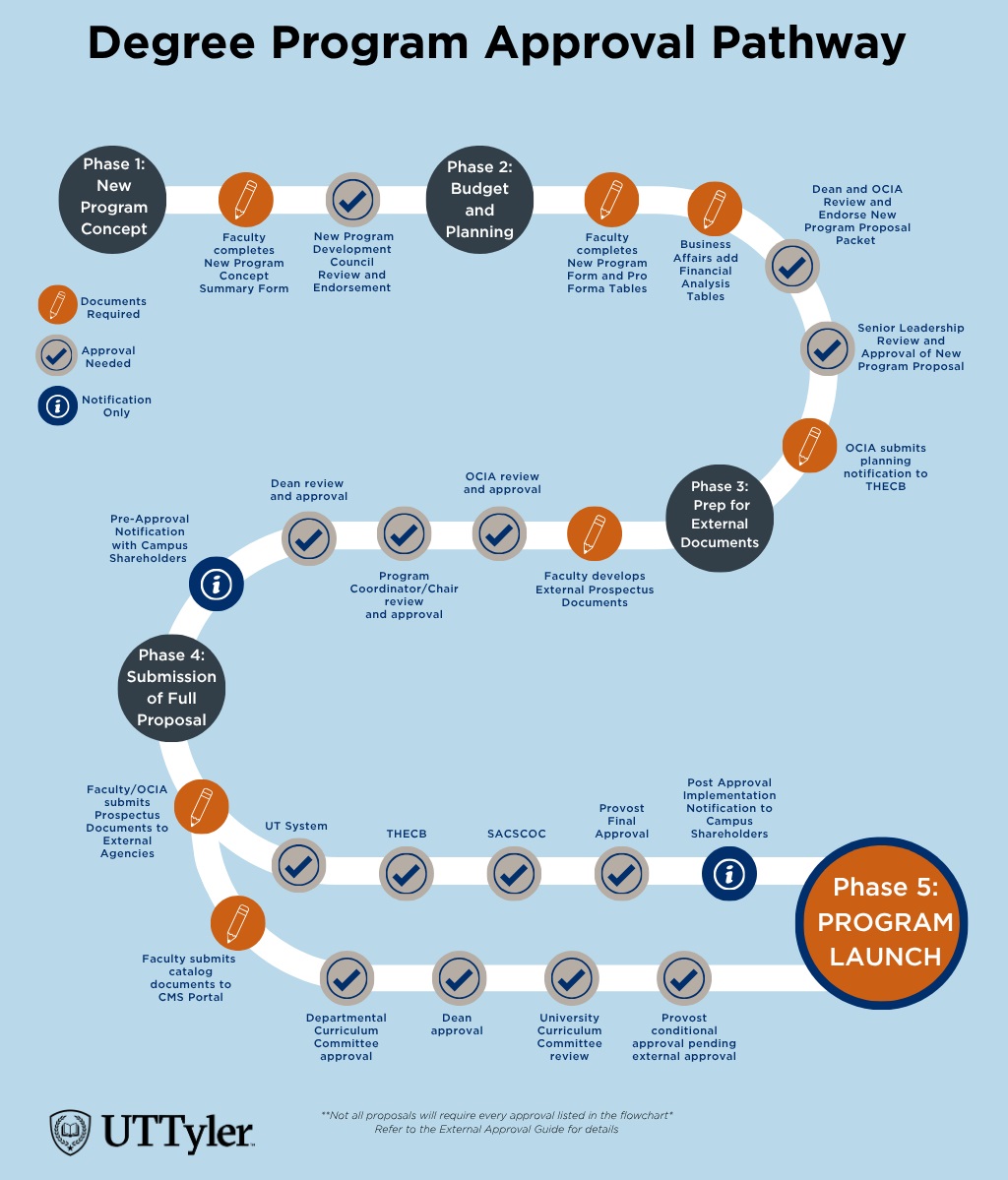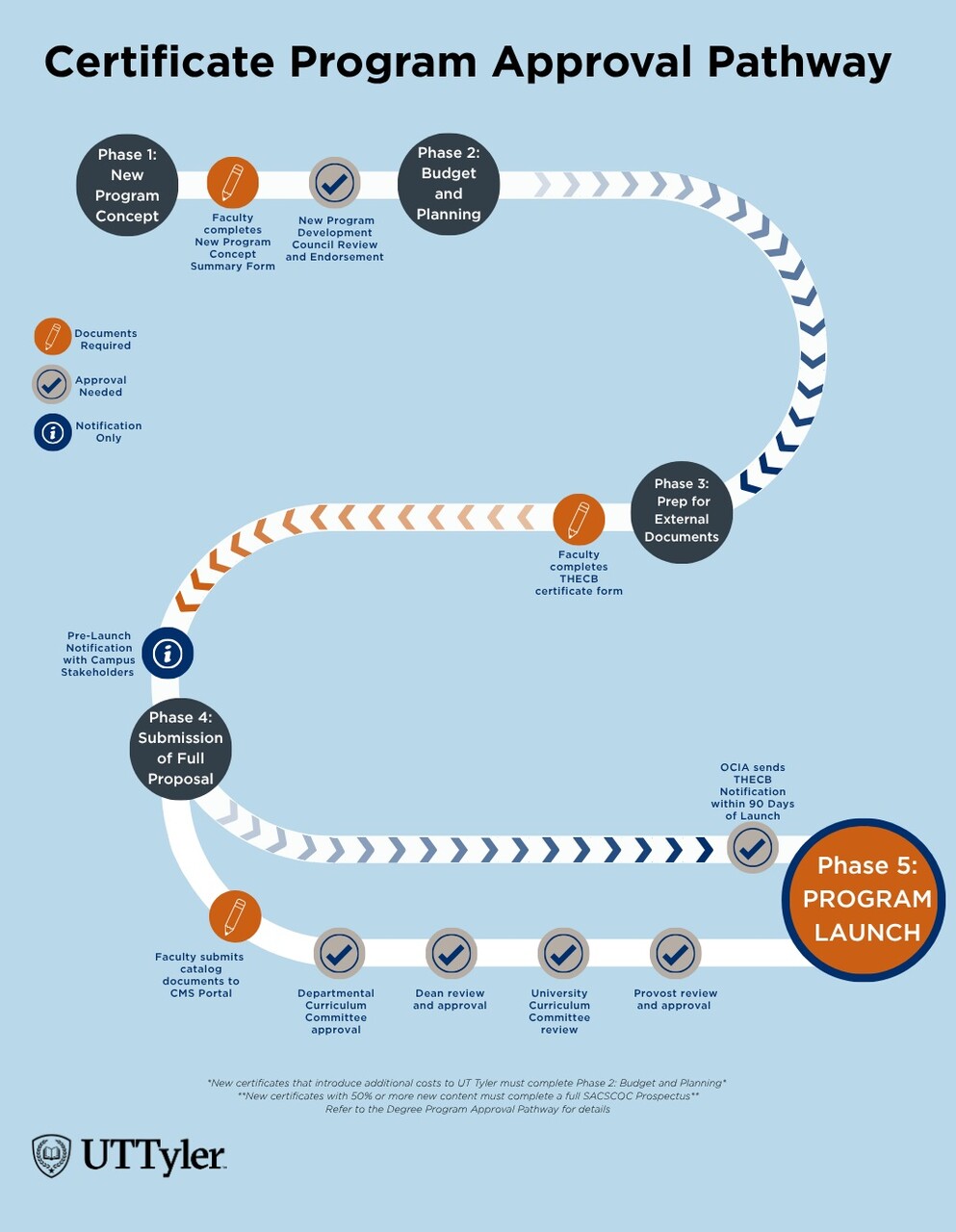New Academic Program - Internal Approval Guide
New Academic Program
Internal Approval Guide
Before seeking any external approvals, all new academic program proposals must go through UT Tyler’s full academic program approval pathway. Faculty planners should begin by engaging the following key stakeholders:
- Department Chair/Program Coordinator
- Dean
- The Office of Continuous Improvement and Accreditation (OCIA)
As illustrated in the Degree and Certificate Program Approval Pathways, additional institutional councils and committees may also be involved. Detailed guidance on proposing a new academic program or making significant changes to an existing one is provided in the following sections.


Five Phases of a New Academic Program Proposal
Phase 1: New Program Concept
The first phase of the new program development process provides faculty with a structured yet accessible way to propose innovative academic program ideas without the immediate need to prepare a full proposal. The purpose of this phase is to assess whether the proposed program aligns with UT Tyler’s mission, vision, and strategic priorities. This early-stage process encourages creativity and collaboration while enabling institutional leadership to evaluate feasibility, strategic relevance, and potential market demand before significant resources are committed.
Key activities include:
- Submission of the New Program Concept Summary Form
New Program Development Council Review
Faculty planners initiate this phase by completing the New Program Concept Summary Form. Once submitted to cia@uttyler.edu, OCIA will review the form for completeness and request additional information if needed. The proposal will then be added to the agenda for the next scheduled New Program Development Council meeting.
Upon endorsement by the New Program Development Council, the proposed program concept advances to the Budget and Planning phase for further review and development.
*Endorsement does not guarantee final approval of the proposal*
Phase 2: Budget and Planning
This phase involves the detailed development of the initial program concept into a more comprehensive academic proposal. It begins with close collaboration among the faculty planner, department or program leadership, college/school leadership, and OCIA. The primary objective is to ensure that the proposed program is financially viable, aligned with institutional priorities, and positioned for long-term success in meeting student, workforce, and community needs.
Key activities include:
- Faculty completion of the New Program Proposal Leadership Summary Form and Pro Forma Tables
- Business Affairs develops the Financial Analysis Tables
Senior Leadership Review
The faculty planner completes the New Program Proposal Leadership Summary with attached Pro Forma Tables. The New Academic Program Proposal Form and Pro Forma Tables must be pre-approved by the Department Chair, Dean, OCIA, and Provost before advancing to the next step of Senior Leadership Review.
If the proposal receives Senior Leadership approval, OCIA submits a planning notification to the Texas Higher Education Coordinating Board (THECB).
Phase 3: Prep for External Documents
In this phase, faculty collaborate with the Office of Continuous Improvement and Accreditation (OCIA) to expand the initial program concept into a comprehensive external prospectus proposal. The external prospectus documents developed during this stage align with the New Program Summary Form and accompanying financial tables previously reviewed by Senior Leadership.
The complete academic proposal must receive approval from OCIA, the Program Coordinator or Chair, and Dean before progressing to the next stage of submission to external agencies.
During this phase, key campus stakeholders are also notified to begin internal planning and resource alignment in preparation for the program’s launch.
Phase 4: Submission of Full Proposal
External Agency
Proposals involving new degrees or substantive changes must be reviewed and approved by external entities such as the UT System, the Texas Higher Education Coordinating Board (THECB), the Southern Association of Colleges and Schools Commission on Colleges (SACSCOC), and professional accrediting bodies as applicable.
Each external agency has its own unique requirements, documentation, and timelines. OCIA works closely with faculty to navigate these requirements and ensure full compliance with all institutional, state, and federal regulations.
The overall external approval process can take up to a year or more, depending on the program’s complexity, level, and the number of approvals required.
Following successful completion of all institutional and external reviews, final approval is granted by the Provost.
Institutional Shared Governance
Each level of the Shared Governance review plays a critical role in evaluating the proposed program alignment with the UT Tyler mission and strategic plan, program relevance in meeting state/regional workforce demand, appropriate academic rigor and quality, student interest and demand, and overall viability of the proposed program.
After securing all necessary administrative approvals, the next step is to initiate the Shared Governance review process by launching the proposal workflow in the Watermark Curriculum Management System (CMS). The faculty planner works in partnership with OCIA to ensure all required documents are uploaded accurately and completely in CMS.
Required CMS documentation:
- New Academic Program Proposal Form
- New Course Proposal Form for each new course
- Program Objectives or Program Learning Outcomes
- Proposed Catalog Copy
- Proposed Degree Plan
- Course Inventory
- Admission Criteria (Graduate Programs Only)
The UT Tyler Shared Governance process includes review and approval by the following groups:
- Departmental Curriculum Committee
- Dean
- University Curriculum Committee
- Provost (pending external approval)
Phase 5: Program Launch
Following required external approvals, the program enters the launch phase, and preparation shifts from planning to implementation. This stage involves coordinating with various campus offices to ensure a smooth rollout and successful student recruitment.
Key implementation steps include:
- Notifying University Registrar, Information Analysis, Marketing, Enrollment Management, Student Business Services, Financial Aid, Recruitment, Admissions, Advising, Military and Veterans Success Center, Career Success, and the Office of Digital Learning.
- Coordinating and executing marketing and communication plans.
- Launching the program according to the approved start term.
Note: Approved academic programs must be launched by the term listed in the final approval documents. Program launch delays must be reported to OCIA.
Additional Support Information
For additional support contact Dr. Lou Ann Berman, Associate Provost for Continuous Improvement and Accreditation.